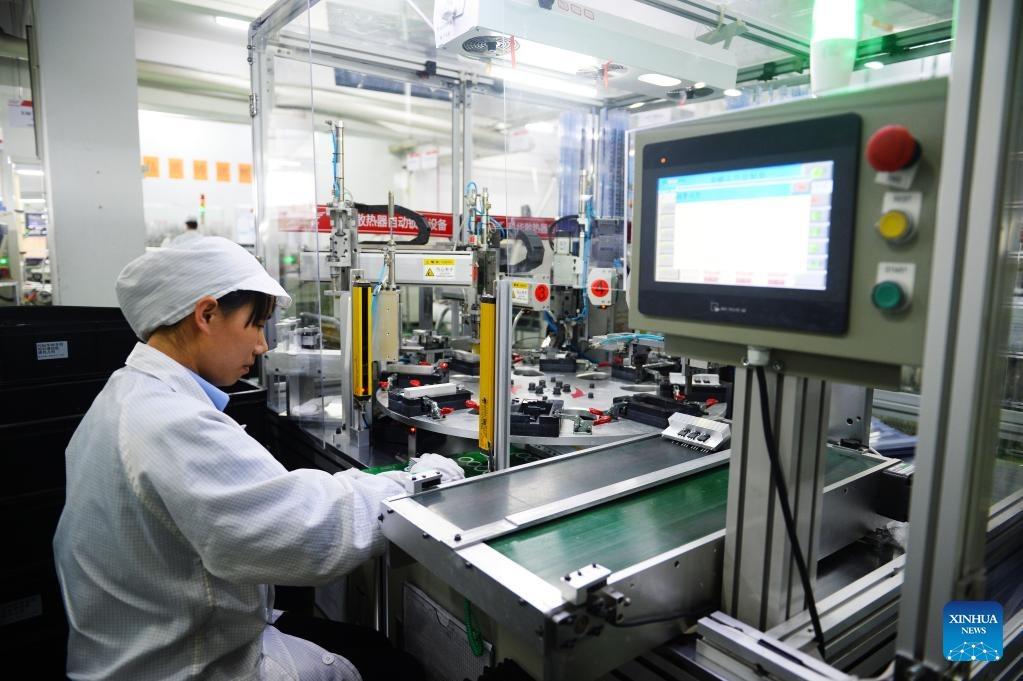 A worker processes circuit boards at a smart workshop of a private enterprise in Zhangzhou, Southeast China's Fujian province, June 19, 2023. (PHOTO / XINHUA)
A worker processes circuit boards at a smart workshop of a private enterprise in Zhangzhou, Southeast China's Fujian province, June 19, 2023. (PHOTO / XINHUA)
The heads of several central government departments have presided over, within 10 days this month, at least six meetings with more than 67 private enterprises from home and abroad to address the companies' concerns and support their sustainable development.
The meetings have sent strong signals that the country will make further efforts to support private enterprises and the economy, which industry experts said is expected to boost market confidence and stimulate economic growth in the second half of the year, given the downward domestic economic pressure.
Liu Shangxi, president of the Chinese Academy of Fiscal Sciences, said that economic recovery was weaker than expected in the first half, and that to stabilize market expectations, a "long-acting reassurance pill" must be given to private companies.
The central government has repeatedly emphasized its unwavering support for the private economy, but private enterprises have not fully enjoyed the benefits of fair competition, said Liu, who also attended a symposium chaired by Premier Li Qiang last week.
Noting that private investment has experienced negative growth in past months, he emphasized that the confidence of private enterprises, which are critical drivers of the country's economic growth, must be bolstered.
According to the National Bureau of Statistics, from January to May, private investment fell by 0.1 percent year-on-year, and the total profit of major private enterprises dropped 21.3 percent year-on-year.
"If the private economy shrinks further, the national economy may accelerate its downturn," he said. "Thus, the government should adjust its regulatory policy to be more certain."
The private economy has also been a driver of the nation's innovative development. Private enterprises contribute about 50 percent of the country's tax revenue, 60 percent of GDP and 70 percent of technological innovation.
Since the beginning of July, a group of ministries or ministry-level bodies, including the National Development and Reform Commission, the Ministry of Commerce, the Ministry of Industry and Information Technology and the Ministry of Science and Technology, have held meetings with private enterprises. The NDRC held two such meetings within seven days.
The focus was mainly on current operational conditions and bottlenecks faced by private enterprises, their views on macroeconomic policies, and their suggestions on future development and policy support.
The State Administration for Market Regulation disclosed to China Daily on Tuesday that it would hold a meeting with 10 small and medium-sized enterprises or individually owned businesses on Wednesday morning to address their operational difficulties.
Zhu Keli, founding director of the China Institute of New Economy, said that the intensive meetings with private enterprises showed that the government is building a normalized communication mechanism between government and companies, and is taking real measures to support private companies.
"It serves as a policy response to increasing downward pressure on economic growth and will greatly boost the investment confidence of private enterprises, which have been a major driver of the economy," he said.
"Learning about the real demands and concerns of private enterprises is also important to ensuring that the upcoming new policies can be made in a targeted manner, and effectively implemented," Zhu added.
The latest data from the State Administration for Market Regulation showed that the number of registered private enterprises exceeded 50.93 million by the end of May, and the proportion of private enterprises in the nation's total number of companies increased to 92.4 percent from 79.4 percent.
A CITIC Securities report said that it has been a practice for the State Council, China's Cabinet, to hold meetings or symposiums with industry experts and company executives to discuss the economic situation in April, July and November. President Xi Jinping presided at high-level meetings with company executives in November 2018 and July 2020, which stabilized market expectations in a timely manner, the report said.
Among the private enterprises that attended meetings with ministries or regulators this month, companies from the manufacturing, consumption and information technology sectors have been a major focus.
Of the 10 private enterprises that attended the meetings held by the NDRC, four were from the manufacturing sector — heavy machinery maker Sany Group, home appliances producer Aux Group, solar energy company Longi Green Energy Technology Co and pharmaceutical company Jemincare.
Four others attending the NDRC meetings were consumption firms — down producer Bosideng, bottled water supplier Nongfu Spring Co, tourism agency Spring Tour and Donkey Meat Cao Catering.
At the conference held by the Ministry of Science and Technology, information technology companies iFlytek, Xiaomi Corp and Alibaba Cloud were among the six private companies that attended.
Zhong Huiyong, a finance professor at Shanghai University of International Business and Economics, said, "The major type of private enterprises (attending the meeting) is consistent with the country's current economic goal of attaching great importance to boosting domestic demand and increasing consumption."
Zhong pointed out that different scales of private enterprises, covering large, medium-sized and small companies, as well as companies from various regions, were invited to the meetings.
During the NDRC meeting, Yu Weijiao, president and founder of YTO Express, said, "We will strive to build an integrated domestic and international logistics supply chain for the country's high-quality development."



